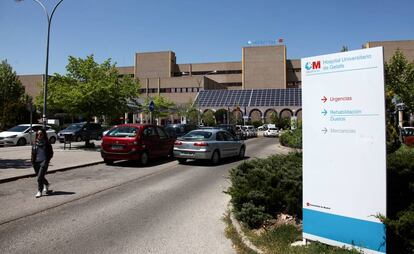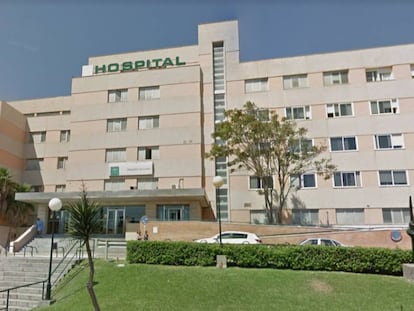Sick criminals: Thieves find easy pickings in Spanish hospitals
Money, cellphones and even cars are disappearing from large medical centers, where there is little oversight

As soon as a patient enters a hospital in the region of Madrid, they receive a Welcome Guide. And this is the first recommendation they will read: ¡°Don¡¯t bring money or valuable items to the hospital. If you have these on you, hand them over to a family member for safekeeping. The hospital will not be held responsible for their potential loss.¡±
This stern warning is normally reinforced by doctors who insist that to avoid being robbed, patients must keep all valuables out of sight in their locker and ensure the locker key is with them at all times.
It is sound advice. Hospitals have become easy pickings for thieves. Patients and their families are prime targets for robbers ¨C they are in an unknown environment, experiencing high levels of stress and are easily distracted. Doctors at the Fundaci¨®n Jim¨¦nez D¨ªaz hospital in Madrid say that they have seen thieves pretending to be sick, then entering the rooms of sleeping or sedated patients. Nurses also regularly urge patients not to leave their valuables lying around.
You can¡¯t imagine who would come here to rob. It¡¯s something that doesn¡¯t cross your mind, but it happens Doctor at Getafe University Hospital
A doctor at Getafe University Hospital, who preferred to remain anonymous, says that ¡°robberies are part of the hospital landscape.¡± ¡°If they steal your cellphone you will realize, but if they steal €10 or €20 you don¡¯t even notice,¡± he explains.
This doctor works in the gynecology department, which has its own particularities: ¡°Here, we only have individual rooms. When a woman is about to give birth, her partner is normally with her and then they move on to the delivery room.¡± In this transition, couples often forget to lock everything up and take the key. When they return, they find their wallet has been emptied, the doctor explains.
The same thing happens to those who leave their room to get an X-ray or an ultrasound, or who go to the neonatal room. ¡°There is an open-door policy here and parents can practically live with their babies. Quite often both of them come to be with the baby, to breastfeed it, and they spend hours away from their room. While they tell you not to leave your belongings lying around, you can¡¯t imagine that someone would come here to rob. It¡¯s something that doesn¡¯t cross your mind, but it happens.¡±
Robbers are often ¡°people who look like they have come to see someone,¡± says the doctor. ¡°In Getafe, everyone is related, they known one another, and this allows the thieves to survey the scene, to study who is likely to be more or less careful. They might be here an entire morning and by the following day they know what to do.¡±
Doctors say they have seen thieves pretending to be sick people, then entering the rooms of sleeping patients
While the thieves typically try to steal cellphones and money, they are willing to try anything. ¡°There are also a lot of robberies in the parking lot. There have even been people who have come with tow trucks to take cars away,¡± the doctor explains. Three of his colleagues, a doctor and two midwives, have had their cars stolen. After reporting the crime, two of the cars were recovered, but the other ¨C a Mercedes ¨C was never found.
The National Police headquarters in Madrid, which has no concrete numbers on the number of such robberies, says that hospitals are being targeted by thieves because they are very large and have lots of people traffic ¨C like an airport or train station.
The 650-bed Getafe University Hospital, like others in Madrid, is well aware of the problem. Security personnel work 24 hours a day and most car parking stations have surveillance cameras.
La Paz and Doce de Octubre hospitals have visitor passes, but Getafe and Madrid¡¯s other main hospitals ¨C Gregorio Mara?¨®n, Severo Ochoa, Fundaci¨®n Jim¨¦nez D¨ªaz and La Princesa ¨C do not have such control measures. To curb the number of robberies, hospital authorities are considering limiting visits, demanding visitor ID, implementing stricter visiting times and introducing paid parking. But the problem is ensuring these measures do not end up negatively affecting patients instead.
English version by Melissa Kitson.
Tu suscripci¨®n se est¨¢ usando en otro dispositivo
?Quieres a?adir otro usuario a tu suscripci¨®n?
Si contin¨²as leyendo en este dispositivo, no se podr¨¢ leer en el otro.
FlechaTu suscripci¨®n se est¨¢ usando en otro dispositivo y solo puedes acceder a EL PA?S desde un dispositivo a la vez.
Si quieres compartir tu cuenta, cambia tu suscripci¨®n a la modalidad Premium, as¨ª podr¨¢s a?adir otro usuario. Cada uno acceder¨¢ con su propia cuenta de email, lo que os permitir¨¢ personalizar vuestra experiencia en EL PA?S.
En el caso de no saber qui¨¦n est¨¢ usando tu cuenta, te recomendamos cambiar tu contrase?a aqu¨ª.
Si decides continuar compartiendo tu cuenta, este mensaje se mostrar¨¢ en tu dispositivo y en el de la otra persona que est¨¢ usando tu cuenta de forma indefinida, afectando a tu experiencia de lectura. Puedes consultar aqu¨ª los t¨¦rminos y condiciones de la suscripci¨®n digital.










































